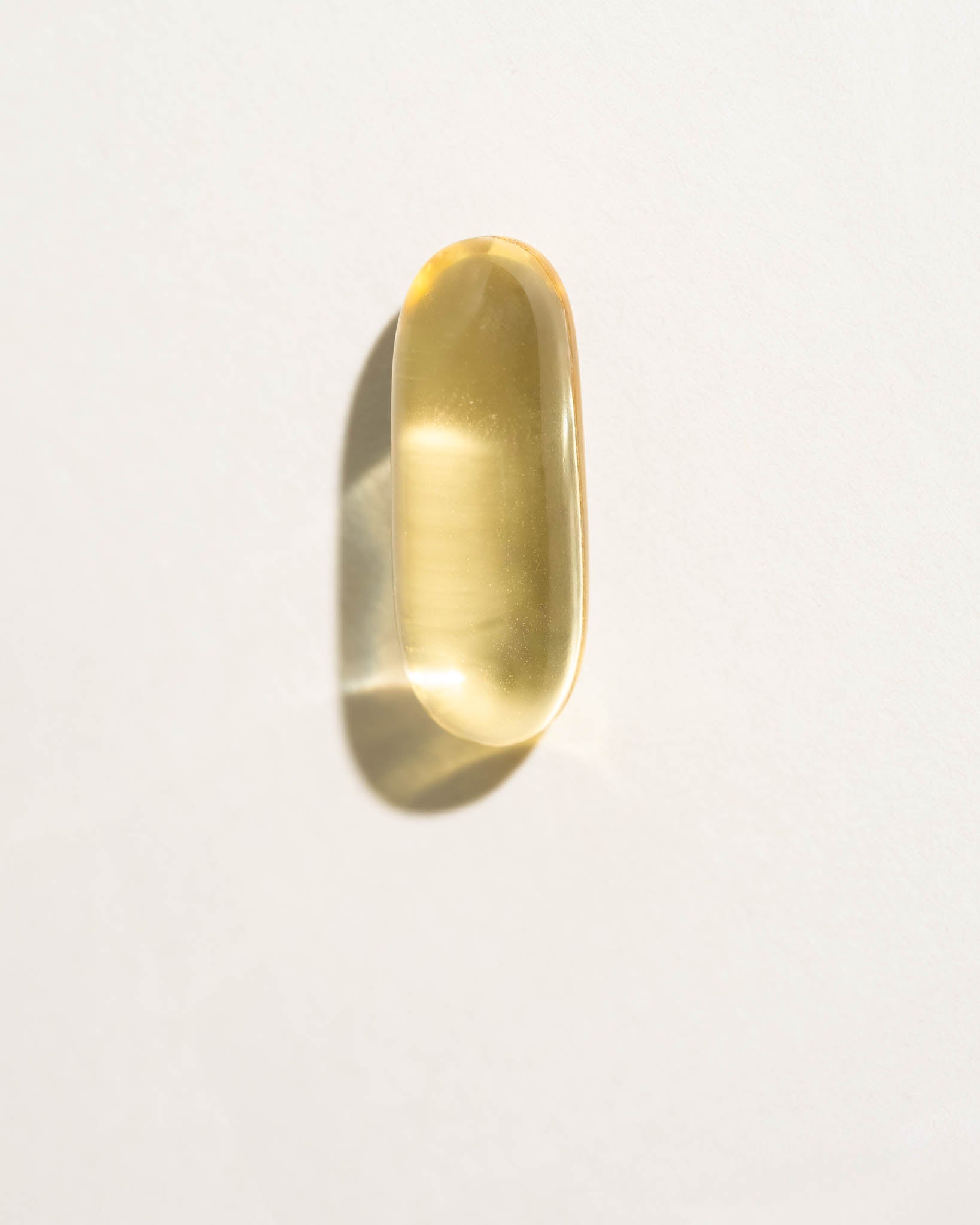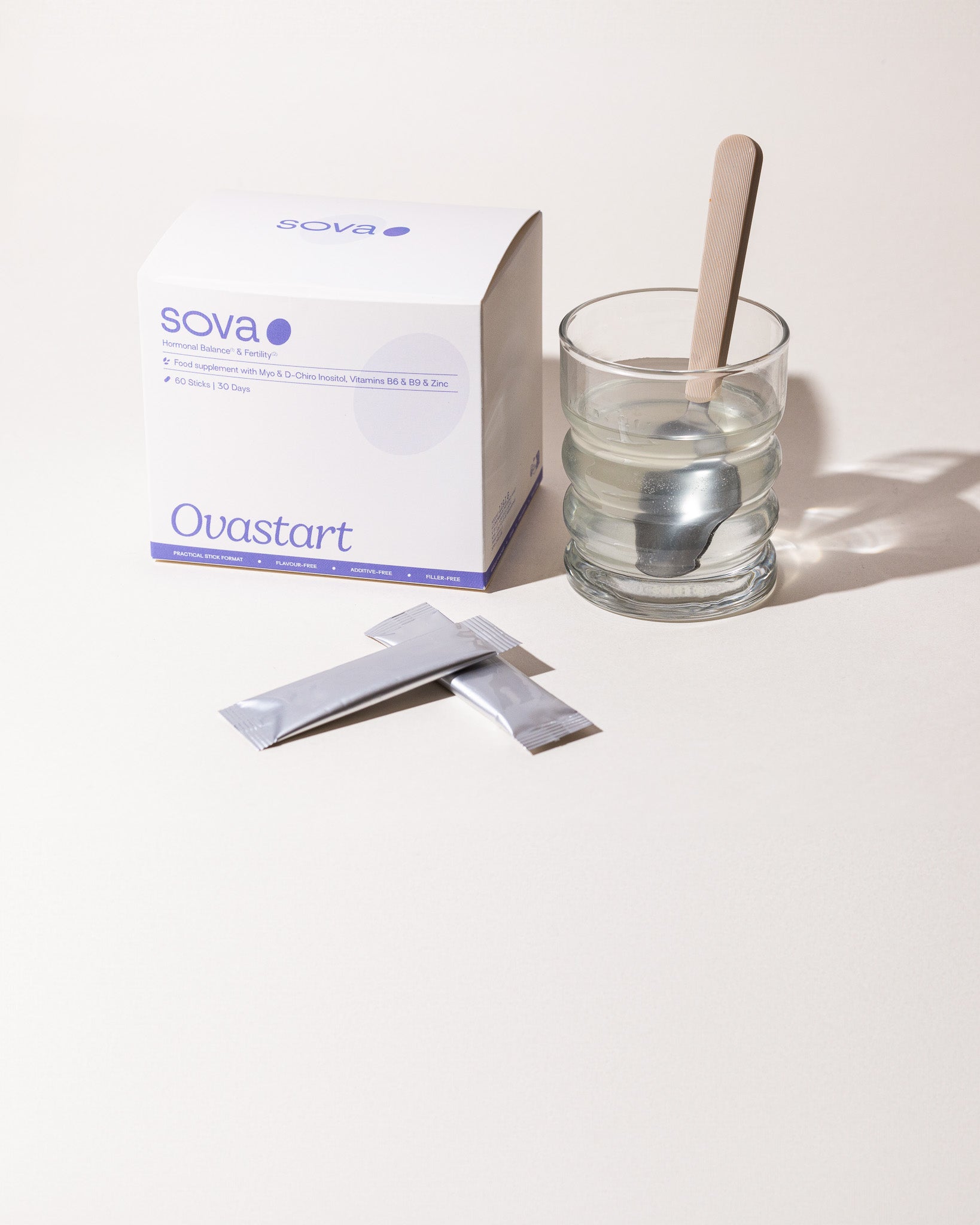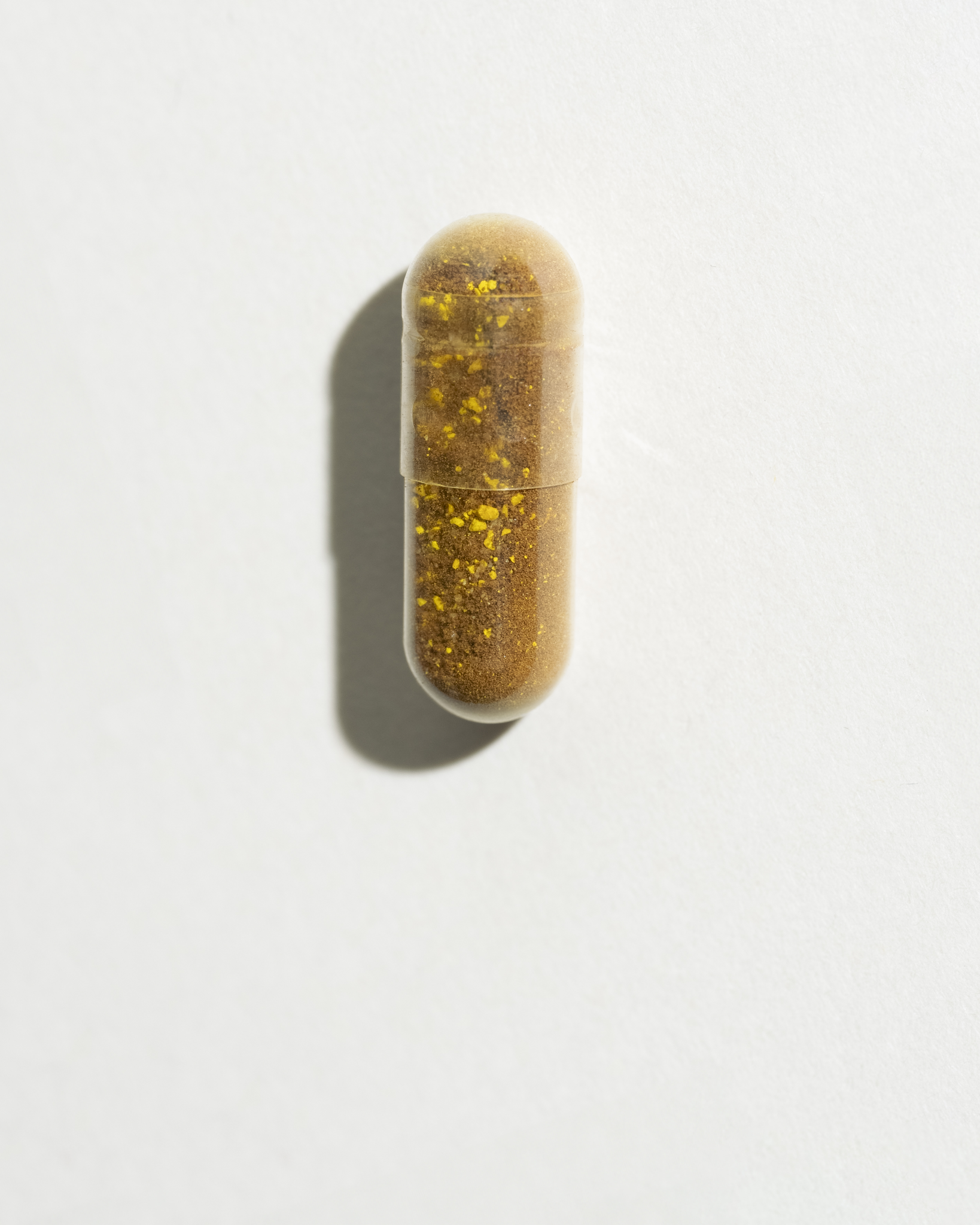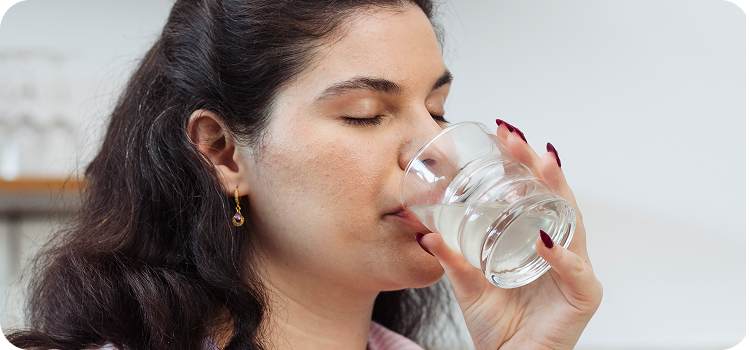Table of contents
Polycystic Ovary Syndrome (PCOS) is a complex hormonal imbalance that affects millions of women worldwide. Often associated with fertility struggles, PCOS is caused by disruptions in hormone production — either from the ovaries or the central nervous system.
Once a diagnosis of PCOS is made, it’s important to dig deeper: what “type” of PCOS are we dealing with? Because the strategy to manage it won’t be the same. PCOS is often classified into four categories:
- insulin-resistant PCOS,
- inflammatory PCOS,
- adrenal PCOS,
- thyroid PCOS.
Some practitioners also mention “post-pill PCOS”, but it’s usually temporary rather than a true type.
👉 Want to know which type you might relate to most? Take our PCOS product quiz — it’ll point you towards a personalised routine with supplements and lifestyle support.
Today, we’ll focus on the lesser-known adrenal PCOS, where the adrenal glands play a major role in hormone imbalance.
What is adrenal PCOS?
PCOS as a whole affects about 1 in 10 women of reproductive age【Azziz et al., J Clin Endocrinol Metab, 2016】. Beyond its impact on fertility, it’s linked to metabolic issues, higher cardiovascular risk, and type 2 diabetes.
Adrenal PCOS is distinguished by the adrenal glands (sitting just above your kidneys) being the main culprit. These glands produce cortisol (the stress hormone) and DHEA, which can be converted into androgens. In adrenal PCOS, they go into overdrive — leading to excess testosterone and other male hormones, disrupting ovulation and cycles.
Symptoms of Adrenal PCOS
Adrenal PCOS shares the usual PCOS symptoms:
- Irregular or absent cycles
- Acne
- Excessive hair growth (hirsutism)
- Hair loss (alopecia)
- Fertility issues
- Weight gain or metabolic struggles
But it often adds stress-driven symptoms because of excess cortisol:
- Anxiety, low mood, irritability
- Sleep disturbances
- Mental fog, poor memory and concentration
- Low libido
- Fatigue or “wired but tired” feeling
👉 If stress and inflammation are your main triggers, you might also want to check out our article on Inflammatory PCOS.
Different forms of stress
Stress is a normal survival mechanism. But when it becomes chronic, it wreaks havoc on hormones like insulin, thyroid hormones, oestrogen, progesterone, FSH and LH.
Stress triggers may include:
-
Excessive exercise (especially competitive or high-intensity)
-
Work overload or emotional pressure
-
Lack of sleep
-
High caffeine or alcohol intake
-
Poor nutrition or restrictive dieting
-
Acute or chronic infections
-
Depression or anxiety
Examples:
-
Being underweight = low body fat, less leptin, less stimulation of FSH & LH → poor oestrogen production → long, irregular, sometimes absent cycles.
-
Being overweight = adipose tissue produces inflammatory molecules, which worsen cortisol imbalance and androgen excess.

How stress fuels adrenal PCOS
When stressed, the pituitary gland secretes ACTH → stimulating the adrenals to pump out cortisol. But it doesn’t stop there:
-
More androgens: To balance cortisol, the adrenals secrete DHEA, which converts into testosterone and other androgens.
-
Higher blood sugar: Cortisol raises glucose to fuel a “fight-or-flight” response. Chronic high blood sugar → inflammation → weight gain.
-
Thyroid slowdown: Cortisol inhibits T4 → T3 conversion, disrupting ovarian activity. (See our article: PCOS and Hypothyroidism).
-
Suppressed ovulation: The hypothalamus and pituitary prioritise survival, reducing LH/FSH → irregular or absent ovulation.
-
Progesterone loss: Cortisol and progesterone share the same precursor (pregnenolone). Under stress, cortisol production wins, leaving progesterone depleted.
It’s a vicious cycle: stress fuels androgens, and androgens worsen PCOS symptoms.

Diagnosis of adrenal PCOS
Diagnosis of PCOS varies by country. In the United States, biological or clinical hyperandrogenism is considered the main criterion.
In Europe, diagnosis is governed by the Rotterdam criteria, which are authoritative. To be diagnosed, 2 of the 3 criteria below must be met:
- Hyperandrogenism, in other words, elevated androgen hormones (DHEA, DHEA-S, DHT/androstanolone, testosterone, etc.),
- At least 12 follicles of 2 to 9 millimetres each and/or an ovarian volume greater than 10 ml, multifollicular ovaries visible on ultrasound,
- Irregular, anovulatory menstrual cycles (without ovulation) or completely absent (amenorrhea).
Some practitioners classify PCOS according to the most active contributors in each woman. However, this classification has no scientific or medical basis.
Some women will be more affected by inflammation, hypothyroidism, others by insulin resistance, stress, anxiety, or after stopping hormonal contraceptives like the pill.
In the case of adrenal PCOS, blood/urine tests may show cortisol levels outside the norms or very close to them, as well as elevated androgen levels, particularly DHEA and DHEA-S.
What to do if you have adrenal PCOS: are there natural solutions?
As a naturopath, I practise a functional approach that involves determining and understanding the root of a health problem to act as much as possible at the core (without curing it because that is not possible).
Since no two PCOS are identical and each woman presents different issues, the role of the naturopath will be to recommend what should make a difference for you, specifically.
For this type of PCOS, reducing and managing stress is crucial to feeling better and must be accompanied by a comprehensive protocol, especially dietary, to nourish the adrenal glands.
Nutrition & Micronutrition:
- Protein-rich breakfasts → stabilise cortisol and blood sugar.
- Anti-inflammatory foods → vegetables, whole grains, healthy fats.
- Avoid stimulants → sugar, processed carbs, excess coffee, alcohol.
- Omega-3 fatty acids → regulate mood, lower inflammation, improve insulin sensitivity【Yang et al., Nutrients, 2020】.
- Magnesium + Vitamin C → both depleted during chronic stress.
- Vitamin D → modulates mood, immunity, and hormones.
👉 Helpful SOVA products:
-
SOVA Omega-3 — high-quality EPAX® oil, rich in EPA & DHA.
-
Ovastart — myo-inositol + folate for cycle regularity.
-
Sugar Balance — berberine, NAC, and cinnamon to stabilise blood sugar (great if stress eating is an issue).
For more details, see our article: Nutrition and PCOS: The Key Rules

Adaptogenic Plants
Adaptogens (herbs, plants, and mushrooms) can be very interesting because they allow an adaptive response to stress. However, not all are adequate due to their potential actions on testosterone (anti-estrogenic action favouring elevated testosterone).
The most interesting ones will be:
- Licorice (to soothe testosterone secretion and help the adrenal glands produce cortisol, with better vitality - but not if you have blood pressure issues)
- Mint (to calm down testosterone)
- Stinging Nettle (to mineralize the body and calm down testosterone)
- Shatavari (for its antioxidant, tonic, and ovulation-boosting effects)
- Ashwagandha for its anti-stress and cortisol lowering effects and thyroid activity support
- Chamomile Matricaria, which is not an adaptogen but a hypnotic and anxiolytic, with the added benefit of reducing LH through testosterone reduction and feedback control.
The most interesting forms for these plants can be infusions, particularly for mint, stinging nettle, licorice, and chamomile matricaria, with up to 3 cups per day. Consult a herbalist to create your own herbal tea!

Emotional balance & stress tools:
We have discussed the problems related to excess stress (excess cortisol secretion, among others). Let's take the time to step back and define what could make a difference in how we respond to stress.
The goal here is to allow you to establish a personal routine to regain energy and stable emotional balance.
However, let me emphasise that if your mind is stuck on various life events which have not yet been processed while still causing suffering, these tools will not be enough; you will need to turn to a psychologist to express yourself without judgement and feel heard.
Sometimes you may feel like you’re stuck with fears holding you back and affecting your self-esteem and confidence. It will often be necessary to sort through the thoughts generating these emotions. Sometimes, it will also be useful to filter out some people you are currently interacting with.
Several tools can help you work on consciousness with the help of sophrology, for example, and on your subconscious through hypnosis or meditation.
Here are some ideas for establishing a routine that will be unique to you and where you can retreat to take care of yourself:
- Cultivate an attitude of openness and acceptance of emotions, feelings, discomfort,
- Don't hesitate to express yourself, talk with your family, partner, close friends, women in the same situation as you, don't keep your anxieties and frustrations to yourself,
- And when it’s difficult, allow yourself to cry, scream into a pillow, dance, run - the goal being to release this stress and free yourself,
- Reread your favourite book,
- Treat yourself to a spa complete with face mask and massage with a soothing oil,
- Look at photos that remind you of happy days.
👉 For a deeper dive, check our blog article on the link between stress and PCOS.
Sleep and Rest, Key Elements in Managing Adrenal PCOS

Lack of sleep is also a source of stress for our body as it will activate the secretion of cortisol (again) and adrenaline, further disrupting hormonal balance. These, if you don’t sleep enough, will replace endorphins and serotonin, potentially leading to negative emotions, causing anxiety disorders, or even depression.
Cortisol also plays an important role in metabolism because it is a hyperglycemic hormone. Increased cortisol levels amplify appetite, sugar consumption, and promote fat storage, mainly in the abdominal area.
Lack of sleep also leads to excessive production of the hunger hormone, ghrelin, and a decrease in its counterpart, the satiety hormone leptin.
Another hormone has a predominant function in our sleep: melatonin. It regulates our circadian rhythm. It guides our phases of wakefulness and sleep and thus our production of hormones related to these phases (melatonin and cortisol). If we disrupt it, communication between these hormones and our brain is disturbed, which can interfere with another communication pathway: the one between our brain and our ovaries!
Melatonin also has a crucial but little-known role: it is a powerful antioxidant!
Oxidative stress is one of the omnipresent elements of PCOS, along with a decrease in intrinsic antioxidant levels.
To reconnect with restful sleep, here are some simple habits to adopt before going to bed:
- Take 5 minutes to write down what happened in your day: a thought you had, events, emotions felt. This allows you to quickly review your day, put words to situations to clarify your thoughts and process events. Finally, make it a positive review with 3 things that were pleasant for you.
- If you feel stressed about the coming day, don’t hesitate to make a small to-do list of tasks not to forget. This way, your mind will be at ease since the ideas won’t be vanishing by day break. The idea is to replace anxious anticipation with serene anticipation. Be careful, these actions should not take too much time as the goal is not to stimulate or push you into deep thoughts.
- Read in paper format or with a blue light-filtering e-reader, comfortably settled with a sleep-specific herbal tea (lemon balm, passionflower, orange blossom).
- Diffuse soothing light or listen to soft music.
- For those who need to be active to be able to relax, gentle stretches like yoga or Pilates are the most suitable.
- Relaxation and meditation exercises aim to stimulate the vagus nerve, which will lower heart rate, relax muscles, and contribute to physiological recovery by promoting emotional calm, proper digestive function, immune function, and sleep.
- Ensure you sleep in the dark and expose yourself to the sun during the day (reasonably and safely, not during the hottest hours).
- Avoid checking your emails before bed, same for all blue screens.
- Take a lukewarm shower before sleeping; if you prefer it hot, it’s better to take it earlier in the evening so as not to affect the onset of sleep.
A healthy lifestyle is an unwavering ally to limit and manage the various expressions of PCOS. Indeed, it will not manifest the same way in everyone!
Final Thoughts
Adrenal PCOS is your body’s way of saying: “I’m stressed out.”
The solution isn’t only in supplements — though they help — but in nurturing your nervous system, diet, sleep, and lifestyle.
👉 Not sure if your PCOS is adrenal, inflammatory, or insulin-resistant? Take our free PCOS product quiz to get a personalised plan and find out if Ovastart, Sugar Balance, or Omega-3 are your best allies.
With small, consistent changes, you can calm the stress-PCOS loop and feel more in balance again. 💜
- ACTH (Adrenocorticotropic hormone) : A hormone released by the pituitary gland that stimulates the adrenal glands to produce cortisol in response to stress.
- Adrenal glands : Two small glands located above the kidneys that produce stress hormones such as cortisol and DHEA, as well as small amounts of androgens.
- Adrenal PCOS : A subtype of PCOS in which excess androgens originate primarily from the adrenal glands rather than the ovaries, often driven by chronic stress and cortisol dysregulation.
- Androgens : Hormones such as testosterone and DHEA that are typically higher in PCOS and can disrupt ovulation, cycles, and skin health.
- Cortisol : The main stress hormone produced by the adrenal glands. Chronically elevated cortisol can worsen insulin resistance, inflammation, and hormonal imbalance in PCOS.
- DHEA / DHEA-S : Androgen precursors produced by the adrenal glands. Elevated levels are commonly seen in adrenal PCOS and contribute to excess testosterone.
- Hypothalamic-pituitary-adrenal (HPA) axis : The communication system between the brain and adrenal glands that regulates stress response and hormone production.
- Pregnenolone steal : A process where stress shifts hormone production toward cortisol at the expense of progesterone, worsening cycle irregularities.
- Rotterdam criteria : The European diagnostic criteria for PCOS, requiring two of three features: hyperandrogenism, polycystic ovaries on ultrasound, or irregular ovulation.
SOVA was created by two sisters with PCOS who wanted products that truly worked. Our formulas are developed in-house with women’s health and micronutrition experts, using ingredients backed by clinical studies and compliant with European regulations.
- Built by women with PCOS, we know the reality of the symptoms.
- Clinically studied, high-quality ingredients, including patented forms like Quatrefolic® and an optimal Myo-/D-Chiro Inositol ratio.
- Holistic support for hormonal balance, metabolic health, inflammation, mood and cycle regulation.
- Transparent, science-led formulas with no unnecessary additives.

















